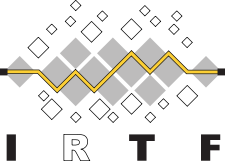At the 2013 IEEE International Symposium on Network Coding (NetCod 2013) several of the tutorials and invited talks were recorded and made available online. You can find the videos here.
Institute of Network Coding seminars
The Institute of Network Coding (INC) has several recordings of the different talks/seminars given there. You can find the list of seminars here.

IETF 91 and the IRTF Network Coding Research Group
 This week the IETF 91 is being held in Honolulu Hawaii and along side it several of the IRTF research groups are also meeting. I will presenting our work on Fulcrum Network Codes a the Network Coding Research Group (NWCRG) on the last day (Friday Nov. 14). You can find the agenda here.
This week the IETF 91 is being held in Honolulu Hawaii and along side it several of the IRTF research groups are also meeting. I will presenting our work on Fulcrum Network Codes a the Network Coding Research Group (NWCRG) on the last day (Friday Nov. 14). You can find the agenda here.
If you want to watch the talks the IETF usually has very good remote participation tools. I would recommend the Meetecho option (direct link for the NWCRG Meetecho here).
Developer cloud services online (leanstack.io)
Once in a while I stumble over some cool cloud service like readthedocs.org (auto generating your documentation) or travis-ci.org (continuous integration build service), but I’ve always had the feeling that there were a ton of other cool services that I did not see.
Now I found a new service called leanstack.io that tries to solve exactly that problem. Leanstack keeps track of the new developer cloud services and keeps a nice categorized inventory for you to browse if you are looking for something concrete.

September 2014 IEEE ComSoc Papers on Network Coding
IEEE Transactions On Communications
- Linear Physical-Layer Network Coding Over Hybrid Finite Ring for
Rayleigh Fading Two-Way Relay Channels
Fang, D. ; Burr, A. ; Yuan, J.
IEEE Transactions On Wireless Communications
- Generalized Wireless Network Coding Schemes for Multihop Two-Way Relay Channels Wang, G. ; Xiang, W. ; Yuan, J.
CoCoNet TPC member for ICC 2015
I will again this year serve as a TPC member for the ICC 2015 CoCoNet workshop.
Find more information about the workshop here. Including call for papers etc.
August 2014 IEEE ComSoc Papers on Network Coding
IEEE Transactions On Communications
- Predicting the Performance of Cooperative Wireless Networking
Schemes With Random Network Coding
Seong, J. ; Lee, H. - Network Coding Decisions for Wireless Transmissions With Delay
Consideration
Mohapatra, A. ; Gautam, N. ; Shakkottai, S. ; Sprintson, A.
IEEE Transactions On Wireless Communications
-
Full Diversity Physical-Layer Network Coding in Two-Way
Relay Channels With Multiple Antennas
Zhang, S. ; Zhou, Q.F. ; Kai, C. ; Zhang, W.
IEEE/ACM Transactions on Networking
-
Repeated Intersession Network Coding Games: Efficiency and Min-
Max Bargaining Solution
Mohsenian-Rad, H. ; Huang, J. ; Wong, V.W.S. ; Schober, R. - Network Coding-Aware Queue Management for TCP Flows Over
Coded Wireless Networks
Seferoglu, H. ; Markopoulou, A.
July 2014 IEEE ComSoc Papers on Network Coding
IEEE Communications Magazine
- Network coding mythbusting: why it is not about butterflies anymore
Medard, M. ; Fitzek, F.H.P. ; Montpetit, M.-J. ; Rosenberg, C.
IEEE Communications Letters
-
Performance Analysis of Finite-Length Spatial–Temporal
Network Coding
Xu, X. ; Zeng, Y. ; Guan, Y.L.
IEEE Transactions On Wireless Communications
- Space-Time Network Coding With Overhearing Relays
Xiong, K. ; Fan, P. ; Yang, H. ; Letaief, K.B.
Source: IEEE Comunications Society’s Publications Contents Digest
Kodo C++ Network Coding Library
This is a library from Steinwurf ApS free for educational and research purposes. I was part of starting Steinwurf back in 2011 and wrote the initial versions of Kodo.
Kodo is a flexible C++ network coding, intended to be used for commercial applications and for research on implementation of Network Coding. The library enable researchers to implement, new codes and algorithms, perform simulations, and benchmark the coding operations on any platform where a C++ compiler is available. The library provide a multitude of build blocks and parameters that can be combined in order to create codes. To ensure ease of use several codes are predefined, and high level API’s provided.
The library is available via GitHub, to gain access you need to sign up for a research/commercial license here: http://steinwurf.com/license
ncutils (Network Coding Utilities)
From the author’s description:
This project is composed by three libraries:
ncutils-java and ncutils-c: these two libraries provide slow but flexible functions to implement network coding ideas both in pure Java and C.
ncutils-codec: this library provides an implementation of random network coding over F2^8. This library is faster than the above but is less flexible. It includes native code to accelerate both encoding and decoding.